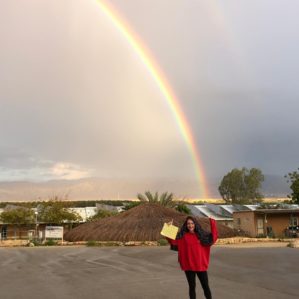- Location: Israel - Kibbutz Ketura
- GPA Requirements: 3.0 GPA
- Application Deadline: February 20 for fall programs and September 20 for spring programs
- Program Term(s): Fall, Spring
- Official Website: Arava Institute for Environmental Studies in Kibbutz Ketura, Israel
| Term | Start Date | End Date |
| Spring 2024 | February 5th, 2024 | June 6th, 2024 |
| Fall 2024 | September 2nd, 2024 | January 2nd, 2025 |
| Spring 2025 | February 10th, 2025 | June 11th, 2025 |
These dates are tentative. Confirm program dates before booking travel.
Eligibility
Students must have completed at least one year at Allegheny and must have a GPA of 3.0 or higher. Courses may have prerequisites.
Where: Kibbutz Ketura, Israel
The Arava Institute is located on Kibbutz Ketura. The community is a desert kibbutz approximately 30 minutes north of Eilat in the Arava Rift Valley. The Kibbutz (Hebrew word for “communal settlement”) is a unique rural community. A kibbutz is a society dedicated to mutual aid and social justice; a socioeconomic system based on the principle of joint ownership of property, equality and cooperation of production, consumption, and education. Today, Ketura has grown to be the second-largest settlement in the region, with over 150 members and candidates and over 155 children. One-third of the members are native Israelis; just less than half the members come from English-speaking countries, with the rest from Europe, South America, and the former USSR. Hebrew is the common language and the language of daily activity in Ketura, but while walking around one might hear many other languages including French, Spanish, Russian, and even Catalan. In addition, Kibbutz Ketura has a vibrant community of young people, including students from the Arava Institute, volunteers from around the world, and young Israelis on a year of community volunteering.
Academics
The Arava Institute offers an accredited university-level semester or yearlong program for both undergraduate and graduate students. Take courses in diverse environmental fields, engage in peace-building and environmental leadership seminars, and partake in educational field trips — all with a diverse student population hailing from Israel, Palestine, Jordan, and beyond.
Students at the Arava Institute explore a range of environmental issues from an exceptional transboundary and interdisciplinary perspective. Under the guidance of leading environmental professionals and academics, students take between four to five courses in both the natural and social environmental sciences. Courses focus on the areas of water management, renewable energy, ecology, sustainable agriculture, environmental politics, and more. Students can also pursue an independent research project in the framework of a 3-credit elective independent study course. All courses are taught in English.
Each student is expected to register for 4 or 5 courses (12 – 15 credits), including at least one compulsory interdisciplinary course. All students are required to participate in the Peace-building Leadership Seminar (PLS), a non-credit course.
Academic Structure
Courses taken with other students at Arava Institute.
Courses
For a full list of course offerings, visit Arava Institute’s website here.
Housing & Student Life
Students live in spacious, air-conditioned dormitories on the main campus, with separate units for males and females. The dormitories consist of apartment units and caravans; each unit has four rooms and a shared kitchenette. Typically, up to eight students live in a unit, with two students sharing a bedroom and bathroom. The campus also has a large common space, equipped with a kitchen, for group study sessions, social events, and meetings. Dormitories are within walking distance of classrooms, Arava Institute offices, the dining hall, laundry services, sports facilities, and the library.
Students eat in the kibbutz dining hall with community members, staff, volunteers, and visitors. They use kibbutz facilities, such as communal laundry and recycling, and participate as volunteers in the dining hall once a semester. Students are invited and encouraged to take part in kibbutz events and holidays.
Application Process
Allegheny students must apply for approval to study off-campus from the Global Education office AND apply directly to their chosen program. For this program, students should work on the Allegheny approval application at the same time as the host program application. The Allegheny approval application deadline is February 20 for fall programs and September 20 for spring programs. Study away approval applications will be reviewed immediately following the appropriate semester deadline. The separate application deadline to apply directly to this program will vary and could be before or after Allegheny’s approval application due date. Check directly on their website (linked at the top of this page) for deadline information. For more information about the study away application process, please visit the application steps page.
Visa Information
All international students must arrange for an Israeli student visa in their home country. It is advised to do this at least a month prior to coming to Israel. Upon arrival to Israel, you will also receive an entry card which you must keep for the duration of your trip. If you have questions about the visa process, please contact admissions@arava.org.
Fees & Costs
Students are charged Allegheny tuition, fees (including a $800 off-campus fee), an AC double room, and a Gator Blue meal plan for the Arava program. Allegheny aid is applied to program costs, excluding campus employment/work study. Additional costs include insurance, international airfare, personal expenses, visa, and a refundable housing security deposit ($120). Students must submit a $50.00 application fee with the application packet to Arava.
